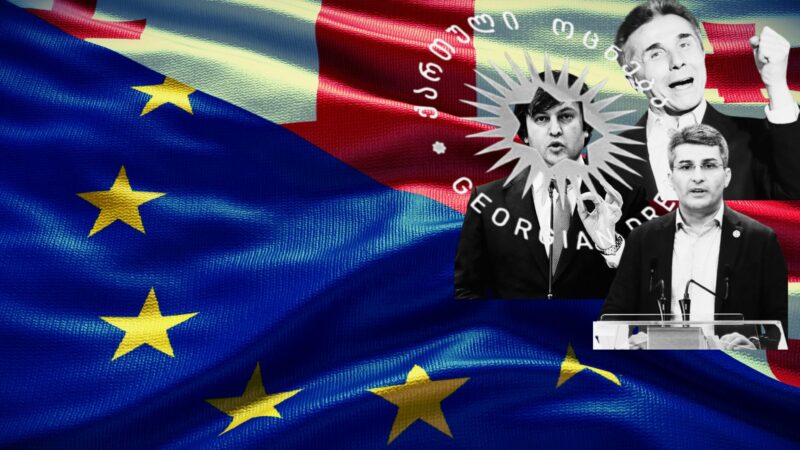
Image by Arzu Geybullayeva
The ruling Georgian Dream party's parliamentary leader, Mamuka Mdinaradze, announced its decision to re-consider a bill on foreign agents on April 3. Last year, when the ruling party announced its decision to adopt the bill, it was met with large public outcry as well as international criticism as similar bills in other countries have jeopardized the work of non-governmental organizations and civic groups. The decision was eventually shelved, only to resurface ahead of a parliamentary vote scheduled for October 2024.
Russia's Foreign Agent Bill
The proposed bill, “on transparency of foreign influence,” was similar to Russia's 2012 “foreign agent” law, which has infamously been used to crush dissent and opposition in Russia since it came into force. It was proposed by a group of parliament members, formally from the ruling Georgian Dream party, who quit the party ranks last year and formed their own political party called People's Power in August 2022. If approved, the bill was going to “compel foreign-funded non-governmental organizations to register as foreign influence agents,” reported Eurasianet.
This time, it is the ruling party proposing the bill, and unlike its previous reiteration, Mdinaradze said the bill would change the way it labels NGOs. Local groups receiving funds from abroad will be labeled as “agents of foreign influence” as opposed to “organizations carrying out the interests of a foreign power. When he announced the decision, Mdinaradze questioned the transparency of local civil society groups and lashed at foreign donors.
🇬🇪 @GeorgianDream41 got new instructions from their masters in the Kremlin. They are so uncreative that they reintroduced the same 🇷🇺 law that Georgian people said NO to.
This law has one goal – to sabotage Georgia's European future. To keep 🇬🇪 in the Russian swamp. Bad idea.
— Viola von Cramon 🇺🇦🇪🇺🇮🇱 (@ViolavonCramon) April 3, 2024
Accusations against local civil society groups have been circulating online, while the ruling party has leveled accusations against foreign donors on a regular basis, accusing them of funding riots and hate speech. Last year, the speaker of the parliament, Shalva Papuashvili, accused Western donors of funding radicals.
Since withdrawing the legislation, the ruling GD party has especially escalated their verbal attacks on Western donors that support and finance Georgian NGOs and media, and accused the donors and Western countries of plotting a violent government overthrow. 2/2
— Eto Buziashvili (@EtoBuziashvili) April 3, 2024
The People's Power premise at the time of their proposal was a conspiracy theory — Georgia was being dragged into the war in Ukraine as part of a plan orchestrated with the help of the European Union, the opposition United National Movement, and Georgian civil society. The conspiracy theory was voiced at the time when the ruling Georgian Dream was facing “the biggest challenge to their ten-year rule” for failing “to secure EU candidate status,” reported Georgian independent news outlet OC Media. Georgia formally applied for EU membership in March 2022, following Russia's invasion of Ukraine — one day after Ukraine made its formal application. At the time, the move was described as a U-turn for the ruling Georgian Dream Party, which had previously insisted it would not accelerate its initial timeline of applying for membership in 2024. Pundits argued this shift was mainly driven by the series of protests that took place in the country as well as opposition pressure.
In March 2024, the party unveiled controversial amendments to the constitution that would ban any gathering, product, or educational program that “popularizes” “same-sex families or intimate relations,” “same-sex or non-heterosexual” child adoption, gender transitioning, the idea there are more than two genders and incest. The changes would also prohibit any medical assistance in gender transitioning or any legal gender recognition for transgender people. This would likely also ban any pride events from being held in the future.
At the time, pundits said the ruling party was sacrificing the country's EU aspirations for a potential electoral advantage.
Georgia formally applied for European Union (EU) membership on March 3, 2022. In June 2022, Georgia's candidate status was declined, instead giving Georgia a list of 12 conditions the country had to fulfill before their application could be reexamined. Among these conditions were reducing political polarization, reforming the judiciary, ensuring functioning state institutions, strengthening anti-corruption measures, including de-oligarchisation, and others. Georgia was finally granted the status in December 2023.
At the end of March, the ruling party also expressed its support for amendments that would repeal gender quotas in the October parliamentary vote.
The President of Georgia, Salome Zourabichvili, accused the ruling party of sabotaging the country's EU membership bid. “Everything is clear now: Georgian Dream have declared quite clearly, they have said no to Europe in every direction,” the president said in her speech. Last year, the president vowed to veto the bill.
The ruling party thinks otherwise. Prime Minister Irakli Kobakhidze argued that the law was indeed European, setting European standards of transparency. The prime minister seems to have forgotten the statement by the EU Foreign Policy Chief, Josep Borell, who said the bill was “incompatible with EU values and standards” when it was first unveiled last year.
Separately, on April 3, in a statement shared on Facebook, the ruling party claimed the law “will protect Georgia from artificial attempts to cause unrest in the country.”
Unsurprisingly, the bill was endorsed by Bidzina Ivanishvili, the billionaire founder of the ruling Georgian Dream party, who returned to politics last year and was named the “honorary chair” of the ruling party.
Ivanishvili is a key figure in Georgian politics. He made his fortune in the pre-Putin era in Russia and founded the Georgian Dream party in 2012. After a brief stint as the country's Prime Minister from 2012–2013, Ivanishvili largely exercised his power and influence through his chairmanship of Georgian Dream. In 2021, Ivanishvili publicly announced his decision to leave politics, but that did not stop some from believing he was still calling the shots behind the scenes from his glass mansion in the capital, Tbilisi. His involvement in domestic politics was also reflected in a European Parliament resolution adopted in June 2022, calling on Georgian officials to impose personal sanctions on Ivanishvili “for his role in the deterioration of the political process in Georgia.”
As such, the timing of Ivanishvili's decision to reenter the political arena has raised eyebrows as the billionaire's announcement came just ten months before the October 2024 parliamentary elections.
Shortly after his return, a major cabinet reshuffling followed.
Civil society strikes back
Protests are expected to take place this week in response to the re-introduced bill according to reporting by OC Media.
“With all the available means, we will confront yet another serious attempt to Russify Georgia,” they said in a joint statement.
Opposition party members called on the citizens to stand with the political opposition as they did last year and “do everything” they could to “not to allow the Georgia Dream to take our country backward,” said Khatia Dekanoidze.
Another opposition politician, Zurab Girchi Japaridze, said, “The streets and protest is the only way.”
On April 3, a number of online news platforms issued a joint statement, saying the bill was an attack on freedom of the press.
“No to Russian law” – independent media held briefing denouncing bringing back foreign agent draft law, which they said will end Georgia's European future. pic.twitter.com/iSH9osw87r
— Mariam Nikuradze (@mari_nikuradze) April 3, 2024
Both the EU and the US have criticized the return of the bill. Judging from the attitude of the ruling party, these criticisms matter little. In an interview with the local paper Netgazeti, the speaker of the parliament, Papuashvili, said the ruling party had crossed red lines before, and yet it still got the EU candidate status. However, the speaker forgets that it was the commitment of the Georgian people, not the Georgian Dream Party, that got the country the status in the first place.

.png) 4 weeks ago
4 weeks ago
















 English (US) ·
English (US) ·